译林版(2020)必修第一册Unit 2 Let's Talk Teens Reading 课件(共82张PPT)
文档属性
| 名称 | 译林版(2020)必修第一册Unit 2 Let's Talk Teens Reading 课件(共82张PPT) | 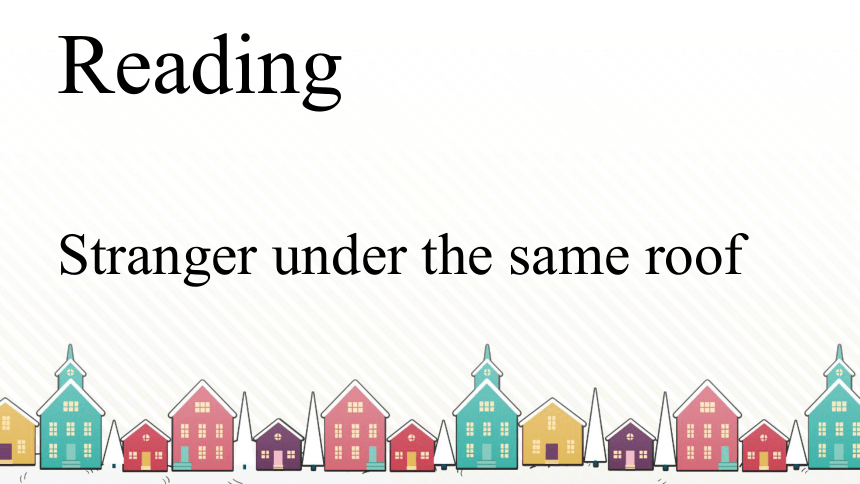 | |
| 格式 | pptx | ||
| 文件大小 | 7.6MB | ||
| 资源类型 | 教案 | ||
| 版本资源 | 牛津译林版(2019) | ||
| 科目 | 英语 | ||
| 更新时间 | 2024-02-22 11:40:08 | ||
图片预览

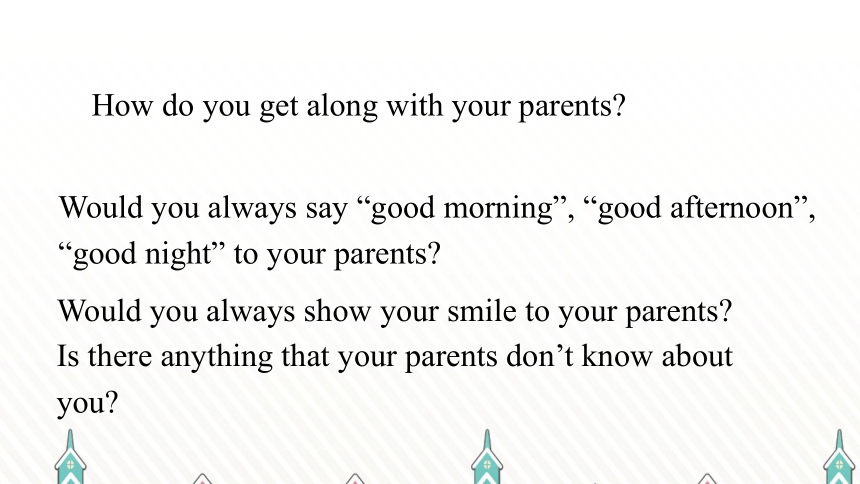
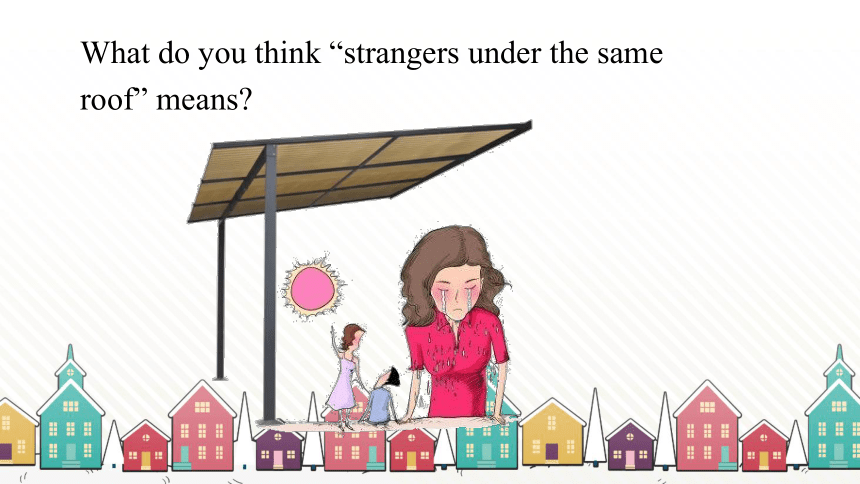
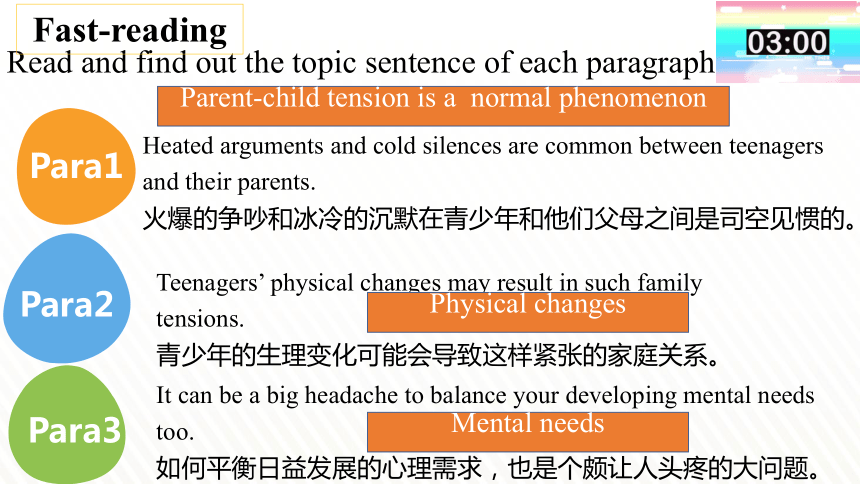

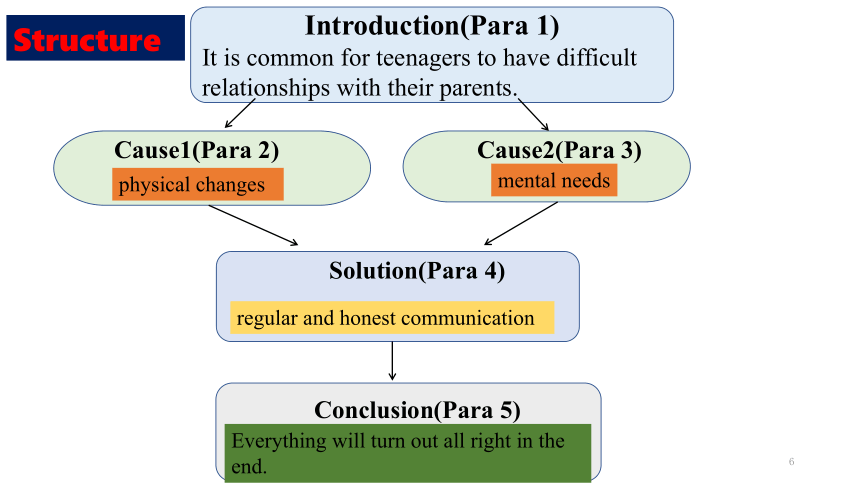
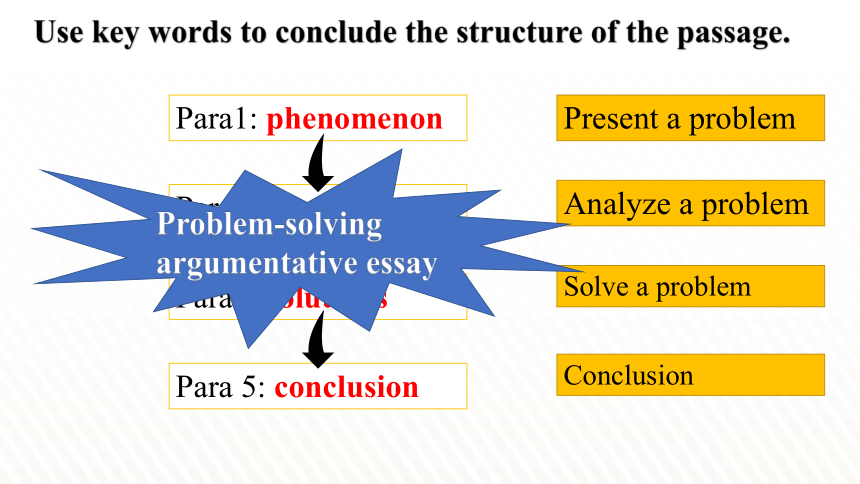
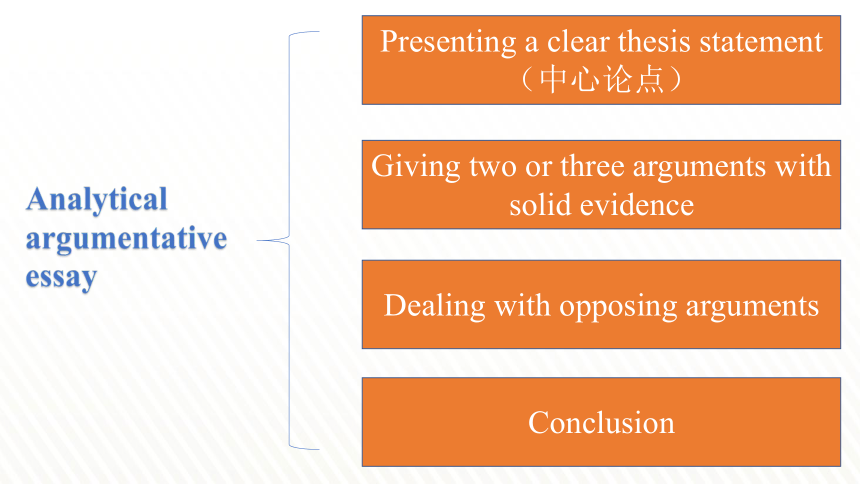
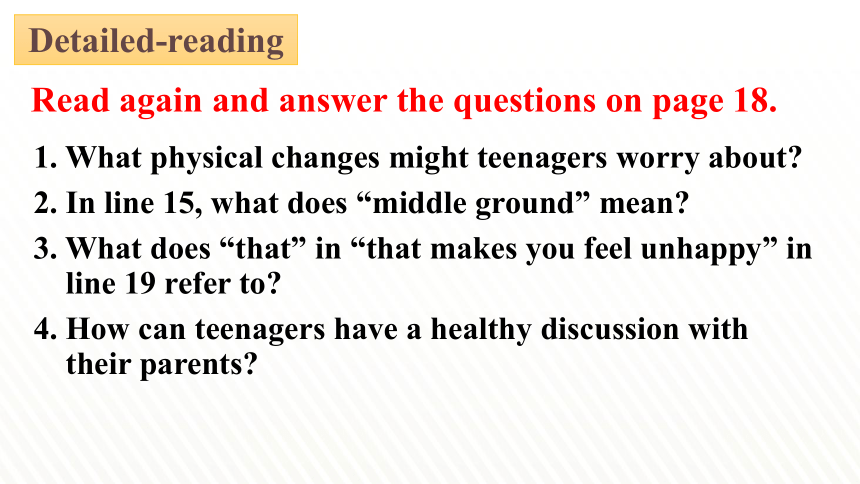
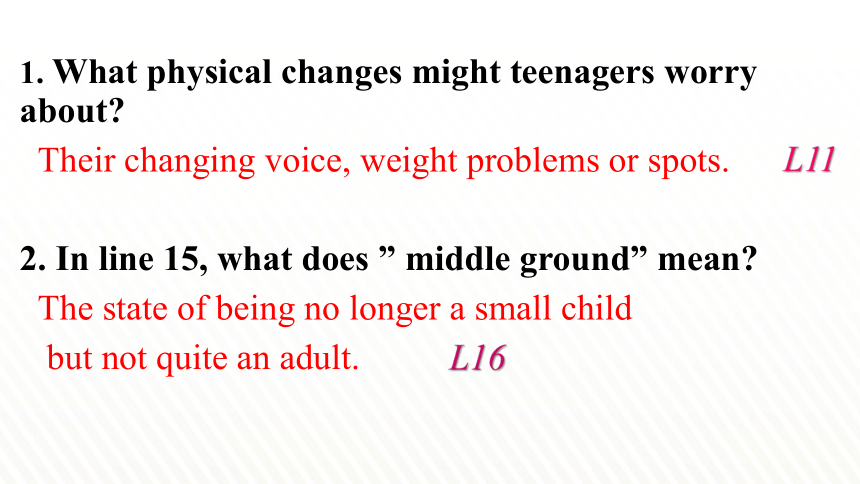
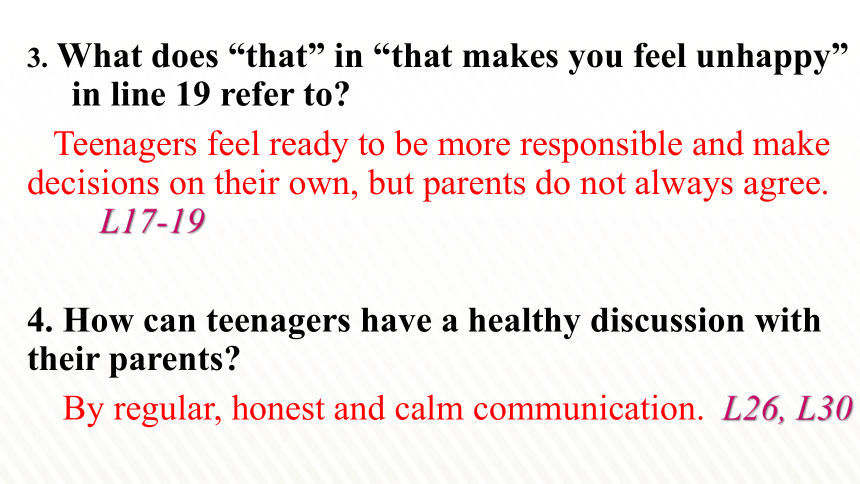

文档简介
(共82张PPT)
Reading
Stranger under the same roof
How do you get along with your parents
Would you always say “good morning”, “good afternoon”, “good night” to your parents
Would you always show your smile to your parents
Is there anything that your parents don’t know about you
What do you think “strangers under the same roof” means
Read and find out the topic sentence of each paragraph.
Para1
Para2
Heated arguments and cold silences are common between teenagers and their parents.
火爆的争吵和冰冷的沉默在青少年和他们父母之间是司空见惯的。
Teenagers’ physical changes may result in such family tensions.
青少年的生理变化可能会导致这样紧张的家庭关系。
Para3
It can be a big headache to balance your developing mental needs too.
如何平衡日益发展的心理需求,也是个颇让人头疼的大问题。
Parent-child tension is a normal phenomenon
Physical changes
Mental needs
Fast-reading
Para4
Although sometimes it may seem impossible to get along as a family, you can take action to improve the situation.
尽管有时候一家人似乎根本无法和睦相处,但你还是可以采取行动改善这一局面。
Para5
Just remember that it is completely normal to struggle with the stress that parent-child tensions create, and that you and your parents can work together to improve your relationship.
你只要记住,亲子关系紧张会产生压力,由此带来的困扰再正常不过,而你的父母可以齐心协力,改善你们的关系。
Skills to deal with this situation
Work together to improve the parent-child tension
6
Introduction(Para 1)
It is common for teenagers to have difficult relationships with their parents.
Cause1(Para 2)
Cause2(Para 3)
physical changes
mental needs
Solution(Para 4)
regular and honest communication
Conclusion(Para 5)
Everything will turn out all right in the end.
Structure
Use key words to conclude the structure of the passage.
Para1: phenomenon
Para2-3: causes
Para4: solutions
Para 5: conclusion
Present a problem
Analyze a problem
Solve a problem
Conclusion
Problem-solving argumentative essay
Presenting a clear thesis statement (中心论点)
Giving two or three arguments with solid evidence
Dealing with opposing arguments
Conclusion
Analytical argumentative essay
Detailed-reading
Read again and answer the questions on page 18.
1. What physical changes might teenagers worry about
2. In line 15, what does “middle ground” mean
3. What does “that” in “that makes you feel unhappy” in
line 19 refer to
4. How can teenagers have a healthy discussion with
their parents
1. What physical changes might teenagers worry about
Their changing voice, weight problems or spots. L11
2. In line 15, what does ” middle ground” mean
The state of being no longer a small child
but not quite an adult. L16
3. What does “that” in “that makes you feel unhappy”
in line 19 refer to
Teenagers feel ready to be more responsible and make decisions on their own, but parents do not always agree. L17-19
4. How can teenagers have a healthy discussion with their parents
By regular, honest and calm communication. L26, L30
How does the writer introduce the topic What's the purpose
By asking questions.
When a group of questions are used to introduce a topic, they are usually not meant to be answered.
Rather, the author intends to draw readers' attention to the topic and make them think about it and take an interest in it.
Detailed-reading
Para 1
1. Which one is not the purpose of writing in the first paragraph
A. To arouse readers' interest.
B. To introduce the topic of parent-child tension.
C. To strike a chord(引起共鸣)
D. To get answers from different persons.
Para 2
What may cause family tensions
1. Develop ________________.
2. ___________ in height.
3. ___________ far behind.
4. A changing _______ .
5. _________ problems.
6. Red _______ .
at a different rate
Shoot up
Get left
voice
Weight
spots
six worries
Physical changes
Para 3
Topic sentence of this paragraph:
It can be a big headache to balance your developing mental needs too.
What are these mental needs
1. A desire for ______________ .
2. A continued need for parents’
______ and ________ .
3. A struggle to ____________ .
4. A wish for parents’________________.
Mental needs
independence
love
support
control feelings
care and patience
Four Needs
Para 3
Para 3
2. Which period will teenagers enter
They will enter a strange middle ground --
no longer a child but not quite an adult.
What does middle ground mean
What does “middle ground” in line 15 mean
child
adult
A new desire for independence.
A continued need for parents’ love and support
Be more responsible
Make decisions on your own
Wish for more caring and patient parents
Para 3
◆ When there is imbalance between teenagers’ independence and parents’ support, what will it result in
Parents are often the first ______ of teenagers’ anger.
All of this can lead to a _________ in the relationship.
targets
breakdown
◆ When a breakdown appears, what should you do
Now read Para 4 to find possible solutions.
Possible solutions to a breakdown
Para 4
Take action to improve the situation — communicate regularly and honestly.
How can we try to communicate and keep the peace
1. ___________ .
2. ___________ the situation from
parents’______________ .
3. Explain your _________________ .
4. ______ carefully.
5. ________ their concerns.
Five tries to communicate and keep the peace
Calm down
Understand
point of view
Listen
actions and feelings
Address
What does the author mainly do in the last paragraph
A. Summarize the whole passage.
B. Give more suggestions.
C. Offer soothing comforts.
What are the comforts
Para 5
soothing宽慰的;使人宽心的
Soothing comforts offered by the author
1. It is completely ________ to struggle with the stress.
2. You and your parents can _____________ to improve your relationship.
3. This _____________ will not last.
4.Everything will ________________ in the end.
5. ________________________ will prepare you for adulthood.
normal
work together
stormy period
turn out all right
The changes and challenges
Para 5
What do you think “stormy period” means
Both teenagers and parents have difficulty in communicating with each other.
This period is full of conflicts.
...
What is the author's attitude to parent-child tensions
optimistic, positive...
Para 5
Teenagers Parents
1.Calm down 2. Think through the situation from parents’ point of view 3. Explain your actions and feelings calmly, listen carefully and address parents’ concerns
Solutions
1. Calm down
2. Be patient
3. Know more about their children
4. Show their concern for their children
...
Is the parent-child tension caused only by teenagers
It’s not uncommon for teenagers to get into heated 1._________ (argue) and cold silences with their parents. There are several reasons 2._________ this situation. For on thing, teenagers’ physical changes are likely to give rise to family 3._________ (tense). For another, 4._________ (enter) a strange middle ground, you may find 5._________ tough to keep your developing mental needs 6. _________ (balance).
arguments
for
tension(s)
entering
it
balanced
Fill in the blanks according to the text.
However, you can take action 7. _________ (improve) the situation. Most 8.___________ (importance), you can establish regular and honest communication with your parents.
It’s better for you and your parents work together to improve your relationship. Everything will turn out well in the end, 9. __________ the struggles you have been going through 10. _________ (get) you ready for adulthood.
to improve
importantly
and
will get
How can you improve the relationship with your parents
First, be grateful. When consider all that our parents have done for us, we may find ourselves feeling thankful to our parents. We can let our parents know that we are appreciative for all they have done for us. We can also show our appreciation with our actions, such as getting them a nice gift or doing some extra housework without being asked.
Second, put ourselves in their shoes. Often, people do not get along because they fail to take others’ perspective. Accept that our parents are different. Think about the ways that their lives may have been different from our life.
Third, avoid unnecessary arguments. Sometimes arguments are unavoidable, but we should do our best to avoid unnecessary quarrels. We can bite our tongues when one of our parents says something controversial.
Determine whether the need to respond is really necessary. If it is, make the point clearly and modestly in order to avoid an overly emotional argument.
Finally, ask for their advice actively. Sometimes problems arise in relationships between parents and children because parents can try to give advice that might hurt our sense of independence. So try only asking for their advice when you really want it.
Homework
Collect words or phrases related to parent-child tensions in the magazine article.
Write a summary of the magazine article (within 60 words).
Words from page 15 to 17
argument
Heated arguments and cold silences are common between teenagers and their parents. (para. 1)
(1) a conversation in which people disagree with each other angrily or noisily
n.[C,U]争吵,争论,辩论
have an argument with sb.( about/ over sth.)
We had an argument with the waiter about the bill.
She got into an argument with her friend.
(2) a statement or set of statements that you use in order to try to convince people that your opinion about something is correct
n.[C]论据,理由,论点
an argument for/ against sth.
Her argument for the trip is that it can broaden our horizons.
His argument against the plan sounds reasonable.
argue with sb. about/ over sth.
和某人争论某事
argue for/ against doing sth
为支持/反对某事而争论
argue sb. into/ out of doing sth
劝某人做/不做某事
argue vi. 争吵, 争论 vi.&vt. 论证
2. Rate
You may feel anxious that you are developing at a different rate to your friends, shooting up in height or getting left far behind. (para. 2)
a measurement of the speed at which sth happens
at a(n)
rate
alarming
average
different
以惊人的速度
frightening
fast/slow
Guess the meanings of rate in the following sentences.
Australia’s unemployment rate rose to 6.5% in February.
n. a measurement of the number of times sth happens or exists during a particular period
2. We offer special reduced rates this week.
n. a fixed amount of money that is charged or paid for sth
3. I may be away next week but at any rate I’ll be back before the meeting.
used to say that a particular fact is true despite what has happened in the past or what may happen in the future
4. At this rate we won’t ever be able to afford a holiday.
(informal) used to say what will happen if a particular situation continues to develop in the same way
照这样的话
无论如何
费用
比率
1. The university is highly rated for its research.
to have or think that sb/sth has a particular level
of quality, value, etc.
2. He is currently rated number three in the world.
to place sb/sth in a particular position on a scale
in relation to similar people or things
Guess the meanings of rate in the following sentences.
be highly thought
排名
3. shoot up
…, shooting up in height or getting left far behind. (para. 2)
If something shoots up, it grows or increases very quickly.
Their kids have shot up since I last saw them.
Sales shot up by 9% last month.
快速长高
激增
1. The police had orders to shoot anyone who attacked them.
2. He shot from midfield and still managed to score.
3. He'd love to shoot his film in Cuba.
4.They had almost reached the boat when a figure shot past them.
开枪,射击,射杀
射门,投篮
拍摄
猛冲
1. 去年票价猛涨。
Ticket prices shot up last year.
2. The movie was shot in black and white.
那部电影拍成了黑白片。
3. 抢劫过程中有三人被开枪打死。
Three people were shot dead during the robbery.
Translate the following sentences.
4. struggle
On the other hand when you are struggling to control your feelings, you wish they could be more caring and patient - sometimes they forget that growing up is a rough ride. (para. 3)
If you struggle to do something, you try hard to do it, even though other people or things may be making it difficult for you to succeed.
vi. 努力; 斗争
They had to struggle against all kinds of adversity (difficluty).
struggle against/ with
struggle for
struggle to do sth
struggle to one’s feet
和...作斗争
为…奋斗
努力做某事
In spite of his serious injury, the old man struggled to his feet and walked towards his home.
挣扎着站起来
We struggle for success all our life; however, it is a struggle to make every day meaningful. The thought of giving up haunts us when we fail again and again, but the desire for flowers and applause tells us to struggle to our feet when we fall over before trouble.
我们一生都在为成功而奋斗,然而,让每天都有意义并非易事。当我们一次又一次地失败时,放弃的想法萦绕心头。但对鲜花和掌声的渴望告诉我们,在困难面前跌倒时,要挣扎着站起来(继续奋斗)。
When you disagree with your parents, take a minute to calm down and try to understand the situation from their point of view. (para. 4)
5. calm
(1)vt. 使平静,使镇静
He took a deep breath to calm himself down.
After I calmed down, I played football better.
(2)adj.镇静的,沉着的
He can always keep calm whatever happens.
The sky is blue, and the sea is calm.
熟词生义-(天气)无风的;(海洋)风平浪静的
常见搭配:keep/stay/remain calm
易混词 区别
calm 平静的,镇静的,指天气”无风”,指海洋”风平浪静”;指人的情绪镇静、平静。
quiet 平静的,安静的,指没有吵闹声、嘈杂声或内心不烦躁。
still 静止的,寂静的,指人时侧重指某人一动不动地保持一种姿势;指物时表示完全没有声音,突出静止不动
silent 沉默的,不说话的,无声的,指人时强调沉默不语,指环境时表示不喧闹的,无声的。
Family tension
Six worries
Four needs
Five tries
Everything will turn out all right in the end.
Review
One day they had a heated (argue) about where to spend their summer holiday.
Most people walk at an average rate of 5 kilometers an hour.
他非常兴奋,我们必须努力使他平静下来。
He is terribly excited. We must try to calm him down.
His daughter has shot recently.
大多数人步行的平均速度为每小时5公里。
他已经同癌症抗争了两年。
He has struggled against cancer for two years.
argument
up
6. view
Your views on something are the beliefs or opinions that you have about it.
n.[C](个人的)看法,意见,见解,态度
What’s your view on this plan
In my view, being admitted to a good university is my dream and I hope I can be a person who makes contributions to my country.
____ ____ ____ the weather, the event will now be held indoors.
2. When the car was first built, the design ____ ____ ____ highly original.
3. This evidence _____ _____ _____ that there is too
much violence on television.
4. The lake soon ____ ____ ____.
5. ____ ____ ____ it was a waste of time.
support the view come into view view … as …
in view of in one’s view
In view of
was viewed
supports the view
came into view
In my view
Choose the phrases from the box to complete the sentences.
After you have thought it through, explain your actions and feelings calmly, listen carefully and address their concerns.(para. 4)
7. address
(1)to think about a problem or a situation and decide how you are going to deal with it
vt. 设法解决,处理,对付
Your essay does address the real issues.
We must address ourselves to the problem of traffic pollution.
致力于某事
(2)If you address a group of people, you give a speech to them.
vt. 向… …做演讲
He is due to address a conference on human rights next week.
n. 演讲
He had scheduled an address to the American people for the evening of May 27.
将要做,预计做
(1)A concern is a fact or situation that worries you.
n.[C/U] 令人担忧的事
His concern was that people would know that he was responsible.
8. Concern
After you have thought it through, explain your actions and feelings calmly, listen carefully, and address their concerns. (para. 4)
(2)Concern for someone is a feeling that you want them to be happy, safe, and well.
n. [U] 关心
Without her care and concern, he had no chance of survival at all.
(3)If something concerns you, it worries you.
The growing number of people seeking refuge in Thailand is beginning to concern Western aid agencies.
vt. 使担忧
(4)If something such as a book or a piece of information concerns a particular subject, it is about that subject.
This book concerns Sandy's two middle-aged children.
vt. 有关于
concern n.
concerned adj.
concern v.
concerning prep.
He asked several questions concerning the causes of the accident.
What concerns me is our lack of preparation for the dry season.
to worry sb
She was concerned that she might miss the turning and get lost.
worried and feeling concern about sth
about sth; involving sb/sth
As far as Americans are concerned, a lot of our hotels are
below average.
used to show what someone’s opinion on a subject is or how it affects them
Guess the meanings of concern/concerned/concerning in the
following sentences.
就某人而言
The mayor was very concerned about the workers’ safety. He showed much concern for those who worked underground and asked them some questions concerning safety. He asked the officials concerned to put safety at the first place.
市长很关心工人的安全。他对那些在地面下工作的人非常关心,并且问了他们一些关于安全的问题。他要求相关的官员把安全放在第一位。
Sentence structure:“make+宾语+省略to的不定式”结构
(1)该结构是 “make+宾语+宾补”结构的一种,make在此为使役动词,意为 “使、让”。其宾语是名词或代词,宾补是省略to的不定式,表示 “使某人/某物做某事”。
“make+宾语+省略to的不定式”结构
(2)该结构在主动语态中使用省略to的动词不定式作宾补,在被动语态中不定式符号to要还原,即 be made to do sth.
When you help others, it will make you feel better about yourself.
Up to a billion people could eventually be made to move because of climate change.
拓展:“make+宾语+宾补”结构的其他形式
(1)“make+宾语+adj.” 表示使某人/某物…
She has won the game, which made her parents proud.
(2) “make+宾语+n. ”表示使某人/某物成为…
(若宾补表示独一无二的职位或头衔,则其前不用冠词)
He has a strong sense of responsibility, so we are willing
to make him monitor of our class.
拓展:“make+宾语+宾补”结构的其他形式
(3)“make+宾语+过去分词”表示使某人/某物被… 构成过去分词的动词与宾语之间是逻辑上的动宾关系。
The speaker raised his voice in order to make himself heard.
“特殊疑问词/ whether+动词不定式”结构
特殊疑问词包括:
疑问代词 who, whom, what (无选择范围 ),
which(有选择范围), whose
疑问副词 when, where, how。
“特殊疑问词/ whether+动词不定式”结构
该结构的具体用法如下:
(1)在句中可以作主语、宾语、表语、同位语等
(注意:作主语时,谓语动词常用单数形式)。
(2)通常用在tell, show, decide, explain, teach, learn, discuss等词后作宾语。
(3)可以转换成相应的名词性从句。
How to make a cake( How we make a cake) is what were going to learn today.(作主语)
He hasn't decided whether to go or stay(= whether he will go or stay). (作宾语)
This room is too small. The problem now is where to put this bookshelf( where we put this bookshelf).(作表语)
I have no idea when to tell(= when I shall tell)her the bad news.(作同位语)
“特殊疑问词/ whether+动词不定式”结构
Mrs Zhao wrote an email to a teen plete the email with the correct forms of the words and phrases in the box below.
anxious argument concern calm down
normal stress struggle go through
Dear Editor,
I am writing to ask for advice on my relationship with my teenage son. To tell
the truth, I often (1)____________ to get along with him.
struggle
Recently we have argued with each other a great deal. He is (2)___________ about his skin because it has started to become very oily, with lots of red spots. He is always angry these days and seems less confident. I keep telling him that these changes are (3)__________, and that things will turn out just fine. Of course, I wanted to show my (4)___________ for his condition, so I asked him to see a doctor.
anxious argument concern calm down
normal stress struggle go through
anxious
normal
concern
But then he became angry and we had a big (5)___________. He told me that I was putting even more (6)___________ on him by talking about his spots all the time. In the end, I sent him to his room. He finally (7)___________, but it took some time. The whole experience was really terrible and I do not want to (8)___________ the same thing again. What should I do
Best wishes
Mrs Zhao
anxious argument concern calm down
normal stress struggle go through
argument
stress
calmed down
go through
The article uses some abstract nouns. Note the following suffixes and think of more abstract nouns formed with them. Then fill in the table below with as many words as you can.
Forming abstract nouns
Abstract nouns refer to ideas or qualities. They
cannot be physically touched, for example, ability, silence and tension. We can form abstract nouns using certain suffixes. Sometimes the final letter(s) of a word should be left out or changed when we add a suffix, e.g. silent-silence, decide→ decision.
Parts of speech Suffixes Words
Adjectives -ce independence
-ty/-ity honesty
Nouns -hood adulthood
-ship relationship
Verbs -ment argument
-tion/-sion communication
-th growth
importance
reality
childhood
membership
movement
conclusion
warmth
How can you improve the relationship with your parents
First, be grateful. When consider all that our parents have done for us, we may find ourselves feeling thankful to our parents. We can let our parents know that we are appreciative for all they have done for us. We can also show our appreciation with our actions, such as getting them a nice gift or doing some extra housework without being asked.
Second, put ourselves in their shoes. Often, people do not get along because they fail to take others’ perspective. Accept that our parents are different. Think about the ways that their lives may have been different from our life.
Third, avoid unnecessary arguments. Sometimes arguments are unavoidable, but we should do our best to avoid unnecessary quarrels. We can bite our tongues when one of our parents says something controversial.
Determine whether the need to respond is really necessary. If it is, make the point clearly and modestly in order to avoid an overly emotional argument.
Finally, ask for their advice actively. Sometimes problems arise in relationships between parents and children because parents can try to give advice that might hurt our sense of independence. So try only asking for their advice when you really want it.
Reading
Stranger under the same roof
How do you get along with your parents
Would you always say “good morning”, “good afternoon”, “good night” to your parents
Would you always show your smile to your parents
Is there anything that your parents don’t know about you
What do you think “strangers under the same roof” means
Read and find out the topic sentence of each paragraph.
Para1
Para2
Heated arguments and cold silences are common between teenagers and their parents.
火爆的争吵和冰冷的沉默在青少年和他们父母之间是司空见惯的。
Teenagers’ physical changes may result in such family tensions.
青少年的生理变化可能会导致这样紧张的家庭关系。
Para3
It can be a big headache to balance your developing mental needs too.
如何平衡日益发展的心理需求,也是个颇让人头疼的大问题。
Parent-child tension is a normal phenomenon
Physical changes
Mental needs
Fast-reading
Para4
Although sometimes it may seem impossible to get along as a family, you can take action to improve the situation.
尽管有时候一家人似乎根本无法和睦相处,但你还是可以采取行动改善这一局面。
Para5
Just remember that it is completely normal to struggle with the stress that parent-child tensions create, and that you and your parents can work together to improve your relationship.
你只要记住,亲子关系紧张会产生压力,由此带来的困扰再正常不过,而你的父母可以齐心协力,改善你们的关系。
Skills to deal with this situation
Work together to improve the parent-child tension
6
Introduction(Para 1)
It is common for teenagers to have difficult relationships with their parents.
Cause1(Para 2)
Cause2(Para 3)
physical changes
mental needs
Solution(Para 4)
regular and honest communication
Conclusion(Para 5)
Everything will turn out all right in the end.
Structure
Use key words to conclude the structure of the passage.
Para1: phenomenon
Para2-3: causes
Para4: solutions
Para 5: conclusion
Present a problem
Analyze a problem
Solve a problem
Conclusion
Problem-solving argumentative essay
Presenting a clear thesis statement (中心论点)
Giving two or three arguments with solid evidence
Dealing with opposing arguments
Conclusion
Analytical argumentative essay
Detailed-reading
Read again and answer the questions on page 18.
1. What physical changes might teenagers worry about
2. In line 15, what does “middle ground” mean
3. What does “that” in “that makes you feel unhappy” in
line 19 refer to
4. How can teenagers have a healthy discussion with
their parents
1. What physical changes might teenagers worry about
Their changing voice, weight problems or spots. L11
2. In line 15, what does ” middle ground” mean
The state of being no longer a small child
but not quite an adult. L16
3. What does “that” in “that makes you feel unhappy”
in line 19 refer to
Teenagers feel ready to be more responsible and make decisions on their own, but parents do not always agree. L17-19
4. How can teenagers have a healthy discussion with their parents
By regular, honest and calm communication. L26, L30
How does the writer introduce the topic What's the purpose
By asking questions.
When a group of questions are used to introduce a topic, they are usually not meant to be answered.
Rather, the author intends to draw readers' attention to the topic and make them think about it and take an interest in it.
Detailed-reading
Para 1
1. Which one is not the purpose of writing in the first paragraph
A. To arouse readers' interest.
B. To introduce the topic of parent-child tension.
C. To strike a chord(引起共鸣)
D. To get answers from different persons.
Para 2
What may cause family tensions
1. Develop ________________.
2. ___________ in height.
3. ___________ far behind.
4. A changing _______ .
5. _________ problems.
6. Red _______ .
at a different rate
Shoot up
Get left
voice
Weight
spots
six worries
Physical changes
Para 3
Topic sentence of this paragraph:
It can be a big headache to balance your developing mental needs too.
What are these mental needs
1. A desire for ______________ .
2. A continued need for parents’
______ and ________ .
3. A struggle to ____________ .
4. A wish for parents’________________.
Mental needs
independence
love
support
control feelings
care and patience
Four Needs
Para 3
Para 3
2. Which period will teenagers enter
They will enter a strange middle ground --
no longer a child but not quite an adult.
What does middle ground mean
What does “middle ground” in line 15 mean
child
adult
A new desire for independence.
A continued need for parents’ love and support
Be more responsible
Make decisions on your own
Wish for more caring and patient parents
Para 3
◆ When there is imbalance between teenagers’ independence and parents’ support, what will it result in
Parents are often the first ______ of teenagers’ anger.
All of this can lead to a _________ in the relationship.
targets
breakdown
◆ When a breakdown appears, what should you do
Now read Para 4 to find possible solutions.
Possible solutions to a breakdown
Para 4
Take action to improve the situation — communicate regularly and honestly.
How can we try to communicate and keep the peace
1. ___________ .
2. ___________ the situation from
parents’______________ .
3. Explain your _________________ .
4. ______ carefully.
5. ________ their concerns.
Five tries to communicate and keep the peace
Calm down
Understand
point of view
Listen
actions and feelings
Address
What does the author mainly do in the last paragraph
A. Summarize the whole passage.
B. Give more suggestions.
C. Offer soothing comforts.
What are the comforts
Para 5
soothing宽慰的;使人宽心的
Soothing comforts offered by the author
1. It is completely ________ to struggle with the stress.
2. You and your parents can _____________ to improve your relationship.
3. This _____________ will not last.
4.Everything will ________________ in the end.
5. ________________________ will prepare you for adulthood.
normal
work together
stormy period
turn out all right
The changes and challenges
Para 5
What do you think “stormy period” means
Both teenagers and parents have difficulty in communicating with each other.
This period is full of conflicts.
...
What is the author's attitude to parent-child tensions
optimistic, positive...
Para 5
Teenagers Parents
1.Calm down 2. Think through the situation from parents’ point of view 3. Explain your actions and feelings calmly, listen carefully and address parents’ concerns
Solutions
1. Calm down
2. Be patient
3. Know more about their children
4. Show their concern for their children
...
Is the parent-child tension caused only by teenagers
It’s not uncommon for teenagers to get into heated 1._________ (argue) and cold silences with their parents. There are several reasons 2._________ this situation. For on thing, teenagers’ physical changes are likely to give rise to family 3._________ (tense). For another, 4._________ (enter) a strange middle ground, you may find 5._________ tough to keep your developing mental needs 6. _________ (balance).
arguments
for
tension(s)
entering
it
balanced
Fill in the blanks according to the text.
However, you can take action 7. _________ (improve) the situation. Most 8.___________ (importance), you can establish regular and honest communication with your parents.
It’s better for you and your parents work together to improve your relationship. Everything will turn out well in the end, 9. __________ the struggles you have been going through 10. _________ (get) you ready for adulthood.
to improve
importantly
and
will get
How can you improve the relationship with your parents
First, be grateful. When consider all that our parents have done for us, we may find ourselves feeling thankful to our parents. We can let our parents know that we are appreciative for all they have done for us. We can also show our appreciation with our actions, such as getting them a nice gift or doing some extra housework without being asked.
Second, put ourselves in their shoes. Often, people do not get along because they fail to take others’ perspective. Accept that our parents are different. Think about the ways that their lives may have been different from our life.
Third, avoid unnecessary arguments. Sometimes arguments are unavoidable, but we should do our best to avoid unnecessary quarrels. We can bite our tongues when one of our parents says something controversial.
Determine whether the need to respond is really necessary. If it is, make the point clearly and modestly in order to avoid an overly emotional argument.
Finally, ask for their advice actively. Sometimes problems arise in relationships between parents and children because parents can try to give advice that might hurt our sense of independence. So try only asking for their advice when you really want it.
Homework
Collect words or phrases related to parent-child tensions in the magazine article.
Write a summary of the magazine article (within 60 words).
Words from page 15 to 17
argument
Heated arguments and cold silences are common between teenagers and their parents. (para. 1)
(1) a conversation in which people disagree with each other angrily or noisily
n.[C,U]争吵,争论,辩论
have an argument with sb.( about/ over sth.)
We had an argument with the waiter about the bill.
She got into an argument with her friend.
(2) a statement or set of statements that you use in order to try to convince people that your opinion about something is correct
n.[C]论据,理由,论点
an argument for/ against sth.
Her argument for the trip is that it can broaden our horizons.
His argument against the plan sounds reasonable.
argue with sb. about/ over sth.
和某人争论某事
argue for/ against doing sth
为支持/反对某事而争论
argue sb. into/ out of doing sth
劝某人做/不做某事
argue vi. 争吵, 争论 vi.&vt. 论证
2. Rate
You may feel anxious that you are developing at a different rate to your friends, shooting up in height or getting left far behind. (para. 2)
a measurement of the speed at which sth happens
at a(n)
rate
alarming
average
different
以惊人的速度
frightening
fast/slow
Guess the meanings of rate in the following sentences.
Australia’s unemployment rate rose to 6.5% in February.
n. a measurement of the number of times sth happens or exists during a particular period
2. We offer special reduced rates this week.
n. a fixed amount of money that is charged or paid for sth
3. I may be away next week but at any rate I’ll be back before the meeting.
used to say that a particular fact is true despite what has happened in the past or what may happen in the future
4. At this rate we won’t ever be able to afford a holiday.
(informal) used to say what will happen if a particular situation continues to develop in the same way
照这样的话
无论如何
费用
比率
1. The university is highly rated for its research.
to have or think that sb/sth has a particular level
of quality, value, etc.
2. He is currently rated number three in the world.
to place sb/sth in a particular position on a scale
in relation to similar people or things
Guess the meanings of rate in the following sentences.
be highly thought
排名
3. shoot up
…, shooting up in height or getting left far behind. (para. 2)
If something shoots up, it grows or increases very quickly.
Their kids have shot up since I last saw them.
Sales shot up by 9% last month.
快速长高
激增
1. The police had orders to shoot anyone who attacked them.
2. He shot from midfield and still managed to score.
3. He'd love to shoot his film in Cuba.
4.They had almost reached the boat when a figure shot past them.
开枪,射击,射杀
射门,投篮
拍摄
猛冲
1. 去年票价猛涨。
Ticket prices shot up last year.
2. The movie was shot in black and white.
那部电影拍成了黑白片。
3. 抢劫过程中有三人被开枪打死。
Three people were shot dead during the robbery.
Translate the following sentences.
4. struggle
On the other hand when you are struggling to control your feelings, you wish they could be more caring and patient - sometimes they forget that growing up is a rough ride. (para. 3)
If you struggle to do something, you try hard to do it, even though other people or things may be making it difficult for you to succeed.
vi. 努力; 斗争
They had to struggle against all kinds of adversity (difficluty).
struggle against/ with
struggle for
struggle to do sth
struggle to one’s feet
和...作斗争
为…奋斗
努力做某事
In spite of his serious injury, the old man struggled to his feet and walked towards his home.
挣扎着站起来
We struggle for success all our life; however, it is a struggle to make every day meaningful. The thought of giving up haunts us when we fail again and again, but the desire for flowers and applause tells us to struggle to our feet when we fall over before trouble.
我们一生都在为成功而奋斗,然而,让每天都有意义并非易事。当我们一次又一次地失败时,放弃的想法萦绕心头。但对鲜花和掌声的渴望告诉我们,在困难面前跌倒时,要挣扎着站起来(继续奋斗)。
When you disagree with your parents, take a minute to calm down and try to understand the situation from their point of view. (para. 4)
5. calm
(1)vt. 使平静,使镇静
He took a deep breath to calm himself down.
After I calmed down, I played football better.
(2)adj.镇静的,沉着的
He can always keep calm whatever happens.
The sky is blue, and the sea is calm.
熟词生义-(天气)无风的;(海洋)风平浪静的
常见搭配:keep/stay/remain calm
易混词 区别
calm 平静的,镇静的,指天气”无风”,指海洋”风平浪静”;指人的情绪镇静、平静。
quiet 平静的,安静的,指没有吵闹声、嘈杂声或内心不烦躁。
still 静止的,寂静的,指人时侧重指某人一动不动地保持一种姿势;指物时表示完全没有声音,突出静止不动
silent 沉默的,不说话的,无声的,指人时强调沉默不语,指环境时表示不喧闹的,无声的。
Family tension
Six worries
Four needs
Five tries
Everything will turn out all right in the end.
Review
One day they had a heated (argue) about where to spend their summer holiday.
Most people walk at an average rate of 5 kilometers an hour.
他非常兴奋,我们必须努力使他平静下来。
He is terribly excited. We must try to calm him down.
His daughter has shot recently.
大多数人步行的平均速度为每小时5公里。
他已经同癌症抗争了两年。
He has struggled against cancer for two years.
argument
up
6. view
Your views on something are the beliefs or opinions that you have about it.
n.[C](个人的)看法,意见,见解,态度
What’s your view on this plan
In my view, being admitted to a good university is my dream and I hope I can be a person who makes contributions to my country.
____ ____ ____ the weather, the event will now be held indoors.
2. When the car was first built, the design ____ ____ ____ highly original.
3. This evidence _____ _____ _____ that there is too
much violence on television.
4. The lake soon ____ ____ ____.
5. ____ ____ ____ it was a waste of time.
support the view come into view view … as …
in view of in one’s view
In view of
was viewed
supports the view
came into view
In my view
Choose the phrases from the box to complete the sentences.
After you have thought it through, explain your actions and feelings calmly, listen carefully and address their concerns.(para. 4)
7. address
(1)to think about a problem or a situation and decide how you are going to deal with it
vt. 设法解决,处理,对付
Your essay does address the real issues.
We must address ourselves to the problem of traffic pollution.
致力于某事
(2)If you address a group of people, you give a speech to them.
vt. 向… …做演讲
He is due to address a conference on human rights next week.
n. 演讲
He had scheduled an address to the American people for the evening of May 27.
将要做,预计做
(1)A concern is a fact or situation that worries you.
n.[C/U] 令人担忧的事
His concern was that people would know that he was responsible.
8. Concern
After you have thought it through, explain your actions and feelings calmly, listen carefully, and address their concerns. (para. 4)
(2)Concern for someone is a feeling that you want them to be happy, safe, and well.
n. [U] 关心
Without her care and concern, he had no chance of survival at all.
(3)If something concerns you, it worries you.
The growing number of people seeking refuge in Thailand is beginning to concern Western aid agencies.
vt. 使担忧
(4)If something such as a book or a piece of information concerns a particular subject, it is about that subject.
This book concerns Sandy's two middle-aged children.
vt. 有关于
concern n.
concerned adj.
concern v.
concerning prep.
He asked several questions concerning the causes of the accident.
What concerns me is our lack of preparation for the dry season.
to worry sb
She was concerned that she might miss the turning and get lost.
worried and feeling concern about sth
about sth; involving sb/sth
As far as Americans are concerned, a lot of our hotels are
below average.
used to show what someone’s opinion on a subject is or how it affects them
Guess the meanings of concern/concerned/concerning in the
following sentences.
就某人而言
The mayor was very concerned about the workers’ safety. He showed much concern for those who worked underground and asked them some questions concerning safety. He asked the officials concerned to put safety at the first place.
市长很关心工人的安全。他对那些在地面下工作的人非常关心,并且问了他们一些关于安全的问题。他要求相关的官员把安全放在第一位。
Sentence structure:“make+宾语+省略to的不定式”结构
(1)该结构是 “make+宾语+宾补”结构的一种,make在此为使役动词,意为 “使、让”。其宾语是名词或代词,宾补是省略to的不定式,表示 “使某人/某物做某事”。
“make+宾语+省略to的不定式”结构
(2)该结构在主动语态中使用省略to的动词不定式作宾补,在被动语态中不定式符号to要还原,即 be made to do sth.
When you help others, it will make you feel better about yourself.
Up to a billion people could eventually be made to move because of climate change.
拓展:“make+宾语+宾补”结构的其他形式
(1)“make+宾语+adj.” 表示使某人/某物…
She has won the game, which made her parents proud.
(2) “make+宾语+n. ”表示使某人/某物成为…
(若宾补表示独一无二的职位或头衔,则其前不用冠词)
He has a strong sense of responsibility, so we are willing
to make him monitor of our class.
拓展:“make+宾语+宾补”结构的其他形式
(3)“make+宾语+过去分词”表示使某人/某物被… 构成过去分词的动词与宾语之间是逻辑上的动宾关系。
The speaker raised his voice in order to make himself heard.
“特殊疑问词/ whether+动词不定式”结构
特殊疑问词包括:
疑问代词 who, whom, what (无选择范围 ),
which(有选择范围), whose
疑问副词 when, where, how。
“特殊疑问词/ whether+动词不定式”结构
该结构的具体用法如下:
(1)在句中可以作主语、宾语、表语、同位语等
(注意:作主语时,谓语动词常用单数形式)。
(2)通常用在tell, show, decide, explain, teach, learn, discuss等词后作宾语。
(3)可以转换成相应的名词性从句。
How to make a cake( How we make a cake) is what were going to learn today.(作主语)
He hasn't decided whether to go or stay(= whether he will go or stay). (作宾语)
This room is too small. The problem now is where to put this bookshelf( where we put this bookshelf).(作表语)
I have no idea when to tell(= when I shall tell)her the bad news.(作同位语)
“特殊疑问词/ whether+动词不定式”结构
Mrs Zhao wrote an email to a teen plete the email with the correct forms of the words and phrases in the box below.
anxious argument concern calm down
normal stress struggle go through
Dear Editor,
I am writing to ask for advice on my relationship with my teenage son. To tell
the truth, I often (1)____________ to get along with him.
struggle
Recently we have argued with each other a great deal. He is (2)___________ about his skin because it has started to become very oily, with lots of red spots. He is always angry these days and seems less confident. I keep telling him that these changes are (3)__________, and that things will turn out just fine. Of course, I wanted to show my (4)___________ for his condition, so I asked him to see a doctor.
anxious argument concern calm down
normal stress struggle go through
anxious
normal
concern
But then he became angry and we had a big (5)___________. He told me that I was putting even more (6)___________ on him by talking about his spots all the time. In the end, I sent him to his room. He finally (7)___________, but it took some time. The whole experience was really terrible and I do not want to (8)___________ the same thing again. What should I do
Best wishes
Mrs Zhao
anxious argument concern calm down
normal stress struggle go through
argument
stress
calmed down
go through
The article uses some abstract nouns. Note the following suffixes and think of more abstract nouns formed with them. Then fill in the table below with as many words as you can.
Forming abstract nouns
Abstract nouns refer to ideas or qualities. They
cannot be physically touched, for example, ability, silence and tension. We can form abstract nouns using certain suffixes. Sometimes the final letter(s) of a word should be left out or changed when we add a suffix, e.g. silent-silence, decide→ decision.
Parts of speech Suffixes Words
Adjectives -ce independence
-ty/-ity honesty
Nouns -hood adulthood
-ship relationship
Verbs -ment argument
-tion/-sion communication
-th growth
importance
reality
childhood
membership
movement
conclusion
warmth
How can you improve the relationship with your parents
First, be grateful. When consider all that our parents have done for us, we may find ourselves feeling thankful to our parents. We can let our parents know that we are appreciative for all they have done for us. We can also show our appreciation with our actions, such as getting them a nice gift or doing some extra housework without being asked.
Second, put ourselves in their shoes. Often, people do not get along because they fail to take others’ perspective. Accept that our parents are different. Think about the ways that their lives may have been different from our life.
Third, avoid unnecessary arguments. Sometimes arguments are unavoidable, but we should do our best to avoid unnecessary quarrels. We can bite our tongues when one of our parents says something controversial.
Determine whether the need to respond is really necessary. If it is, make the point clearly and modestly in order to avoid an overly emotional argument.
Finally, ask for their advice actively. Sometimes problems arise in relationships between parents and children because parents can try to give advice that might hurt our sense of independence. So try only asking for their advice when you really want it.
